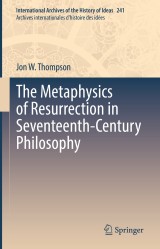Details

The Metaphysics of Resurrection in Seventeenth-Century Philosophy
International Archives of the History of Ideas Archives internationales d'histoire des idées, Band 241
|
117,69 € |
|
| Verlag: | Springer |
| Format: | |
| Veröffentl.: | 14.11.2022 |
| ISBN/EAN: | 9783031101687 |
| Sprache: | englisch |
Dieses eBook enthält ein Wasserzeichen.
Beschreibungen
<p>This book provides a new account of the emergence of the philosophy of personal identity in the early modern period. Reflection on personal identity is often thought to have begun in earnest with John Locke’s famous consciousness-based account, published in the 2<sup>nd</sup> Edition of the <i>Essay</i> in 1694. The present work argues that we ought to understand modern notions of personal identity, including Locke’s own, as emerging from within debates about the metaphysics of resurrection across the seventeenth century. It recovers and analyses theories of personal identity and resurrection in Locke and Leibniz, as well as largely-forgotten theories from the Cambridge Platonists, Thomas Jackson, and Francisco Suárez. The book narrates a time of radical change in conceptions of personal identity: the period begins with a near-consensus on hylomorphism, according to which the body is an essential metaphysical part of the person. The re-emergence of platonism in the period then undermines the centrality of the body for personal identity, and this lays the groundwork for a more thoroughly ‘psychological’ account of personal identity in Locke. This work represents the first scholarly study to thoroughly situate early modern conceptions of personal identity, embodiment, and the afterlife within the context of late scholasticism. Finally, due to its focus on the arguments of the authors in question, the work will be of interest to philosophers of religion as well as historians of philosophy. <br></p><p></p><p></p><p></p><p></p><div><div><p></p>
</div> </div>
</div> </div>
Chapter 1: Introduction.- Chapter 2: Theological and Historical Background- Chapter 3: ‘Re-embodying the Soul’: Resurrection in 17th Century Hylomorphism and Cartesian Trialism.- Chapter 4: ‘A More Amiable and Elegant Body’: The Platonic Turn.- Chapter 5: Resurrection without Substance: Locke on the Resurrection of the Person .- Conclusion.- Index.
<p><b>Jon Thompson</b> holds a PhD in Philosophy from King’s College London. He has held postdoctoral research fellowships in Cambridge and Chicago and has taught Philosophy at the University of Cambridge and at the College of William & Mary. Dr Thompson is the inaugural Director for Cambridge House in Williamsburg, Virginia. </p><p></p>
<p>This book provides a new account of the emergence of the philosophy of personal identity in the early modern period. Reflection on personal identity is often thought to have begun in earnest with John Locke’s famous consciousness-based account, published in the 2<sup>nd</sup> Edition of the <i>Essay</i> in 1694. The present work argues that we ought to understand modern notions of personal identity, including Locke’s own, as emerging from within debates about the metaphysics of resurrection across the seventeenth century. It recovers and analyses theories of personal identity and resurrection in Locke and Leibniz, as well as largely-forgotten theories from the Cambridge Platonists, Thomas Jackson, and Francisco Suárez. The book narrates a time of radical change in conceptions of personal identity: the period begins with a near-consensus on hylomorphism, according to which the body is an essential metaphysical part of the person. The re-emergence of platonism in the period then undermines the centrality of the body for personal identity, and this lays the groundwork for a more thoroughly ‘psychological’ account of personal identity in Locke. This work represents the first scholarly study to thoroughly situate early modern conceptions of personal identity, embodiment, and the afterlife within the context of late scholasticism. Finally, due to its focus on the arguments of the authors in question, the work will be of interest to philosophers of religion as well as historians of philosophy. </p><p></p>
Sheds new light on theories of personal identity Provides systematic treatment of the theories of resurrection Highlights significance of historically overlooked figures such as the Late Scholastics

















